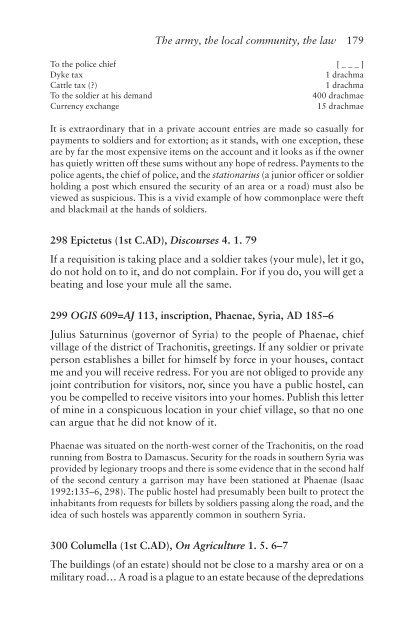The Roman Army, 31 BC–AD 337: A Sourcebook
The Roman Army, 31 BC–AD 337: A Sourcebook
The Roman Army, 31 BC–AD 337: A Sourcebook
Create successful ePaper yourself
Turn your PDF publications into a flip-book with our unique Google optimized e-Paper software.
<strong>The</strong> army, the local community, the law 179<br />
To the police chief [ _ _ _ ]<br />
Dyke tax 1 drachma<br />
Cattle tax (?) 1 drachma<br />
To the soldier at his demand 400 drachmae<br />
Currency exchange 15 drachmae<br />
It is extraordinary that in a private account entries are made so casually for<br />
payments to soldiers and for extortion; as it stands, with one exception, these<br />
are by far the most expensive items on the account and it looks as if the owner<br />
has quietly written off these sums without any hope of redress. Payments to the<br />
police agents, the chief of police, and the stationarius (a junior officer or soldier<br />
holding a post which ensured the security of an area or a road) must also be<br />
viewed as suspicious. This is a vivid example of how commonplace were theft<br />
and blackmail at the hands of soldiers.<br />
298 Epictetus (1st C.AD), Discourses 4. 1. 79<br />
If a requisition is taking place and a soldier takes (your mule), let it go,<br />
do not hold on to it, and do not complain. For if you do, you will get a<br />
beating and lose your mule all the same.<br />
299 OGIS 609=AJ 113, inscription, Phaenae, Syria, AD 185–6<br />
Julius Saturninus (governor of Syria) to the people of Phaenae, chief<br />
village of the district of Trachonitis, greetings. If any soldier or private<br />
person establishes a billet for himself by force in your houses, contact<br />
me and you will receive redress. For you are not obliged to provide any<br />
joint contribution for visitors, nor, since you have a public hostel, can<br />
you be compelled to receive visitors into your homes. Publish this letter<br />
of mine in a conspicuous location in your chief village, so that no one<br />
can argue that he did not know of it.<br />
Phaenae was situated on the north-west corner of the Trachonitis, on the road<br />
running from Bostra to Damascus. Security for the roads in southern Syria was<br />
provided by legionary troops and there is some evidence that in the second half<br />
of the second century a garrison may have been stationed at Phaenae (Isaac<br />
1992:135–6, 298). <strong>The</strong> public hostel had presumably been built to protect the<br />
inhabitants from requests for billets by soldiers passing along the road, and the<br />
idea of such hostels was apparently common in southern Syria.<br />
300 Columella (1st C.AD), On Agriculture 1. 5. 6–7<br />
<strong>The</strong> buildings (of an estate) should not be close to a marshy area or on a<br />
military road… A road is a plague to an estate because of the depredations



